| Reviews & Columns |
|
Reviews DVD TV on DVD Blu-ray 4K UHD International DVDs In Theaters Reviews by Studio Video Games Features Collector Series DVDs Easter Egg Database Interviews DVD Talk Radio Feature Articles Columns Anime Talk DVD Savant Horror DVDs The M.O.D. Squad Art House HD Talk Silent DVD
|
DVD Talk Forum |
|
|
| Resources |
|
DVD Price Search Customer Service #'s RCE Info Links |
|
Columns
|
|
|
Wicked, Wicked (Warner Archive Collection)
Double the mistakes. Warner Bros.' Archive Collection line of hard-to-find library and cult titles has released Wicked, Wicked, the 1973 horror suspenser from Metro-Goldwyn-Mayer, starring David Bailey, Tiffany Bolling, Randy Roberts, Edd "Kookie" Byrnes (he hates it when people put that "Kookie" in there), Scott Brady, Diane McBain, Madeleine Sherwood, Roger Bowen, Indira Danks, and Arthur O'Connell. Written, produced and directed by Green Acres' Richard L. Bare, Wicked, Wicked is only remembered today for introducing the world to "Duo-Vision"...which was nothing more than constant split-screening...which the world didn't ask for in movies...and from which the world stayed away in droves. Seen today, Wicked, Wicked's Duo-Vision makes for, at best, mildly diverting slasher fare: initially intriguing as you get used to the Duo-Vision process...but then increasingly frustrating as you realize nothing too terribly interesting is going to be done with it after a few first promising moments. As for the movie(s) itself...it's laughably Crappy, Crappy. An original trailer is included in this okay anamorphically-enhanced widescreen transfer (restored here on disc to its original 2.0 stereo presentation, as well).
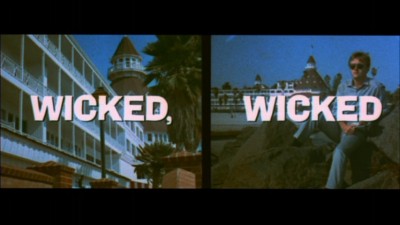
At the decrepit Bates Motel vast Grandview Hotel in Southern California, beautiful blonde criminal Marion Crane beautiful blonde criminal Dolores Hamilton (Diane McBain, looking properly dejected) checks in, unaware that Norman Bates is secretly watching her unaware that a shadowy employee of the hotel is watching her. In her room, stripping down to her black bra and panties, Dolores is suddenly viciously stabbed, her bloody body temporarily dumped in the tub...while her killer calmly orders the prime rib from Room Service, medium rare. The next morning, when the chambermaid (Patsy Garrett) alerts the manager, Mr. Simmons (Roger Bowen), that Ms. Hamilton is nowhere to be found, Simmons suspects yet another skip-out guest, and angrily calls for Rick Stewart (David Bailey, pint-sized machismo), the hotel's stud house dick...who's occupied nailing Genny the gift store clerk (game Indira Danks), when the call comes in. Meanwhile, hotel maintenance man Jason Gant (Randolph "I was the second Chuck Cunningham for two seconds" Roberts) is busy having flashbacks to his horrible childhood, where he was passed around to abusive foster parents who alternately tried to get him drunk or naked. His boss, Fenally (Arthur O'Connell, wasted), thinks the boy odd, but long-time hotel guest Lenore Caradyne (Madeleine Sherwood, walking away with the acting honors here), enjoys mothering/stealth seducing the kindly Jason--perhaps in a bid for financial help, since Lenore is about to be kicked out on her can for non-payment of rent (Lenore's other conquest, shifty-eyed creep Hank Lassiter, played to perfection by Edd "Kookie" Byrnes, is another hotel employee...one who isn't above a little peeping now and then). Enter Lisa James (Tiffany Bolling. Gorgeous. Terrible.), the Grandview's new featured performer in the hotel lounge. Funny thing: Lisa used to be married to Rick. Even funnier: when she dons a blonde wig for her gig, she immediately attracts the attention of the hotel's resident psycho, who wants nothing more than to add Lisa to his grotesque, um...collection.
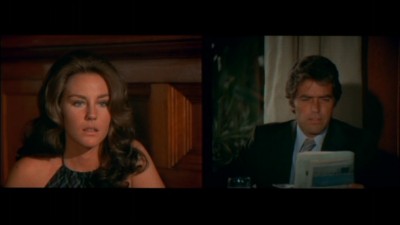
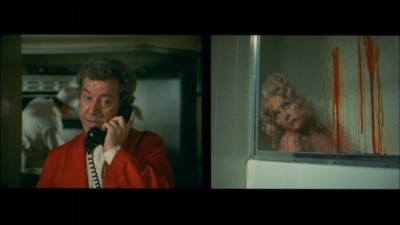
When Wicked, Wicked was released in 1973, its studio, M-G-M, under the penurious control of James Aubrey (it seems like I'm writing a lot about him lately...) might as well have been AIP, with the former "Tiffany" movie factory now sneaking out a severely cut-back schedule that was almost exclusively devoted to cheap exploitation numbers like Sweet Jesus, Preacherman, Deadly China Doll, and The Slams (even the studio's two big hits that year--Soylent Green and Westworld--could be assigned high-class exploiter status). Wicked, Wicked was pretty typical fare from the Aubrey Metro years--inexpensive, tawdry, and not particularly well-executed. Even its main claim to fame--the ultimately unimpressive "Duo-Vision"--is a gimcrack fake more accurately viewed as promotional ballyhoo than a real screen innovation. The ads and poster work ("No Glasses--All You Need Are Your Eyes!"), and the opening title card ("You are about to see a new concept in motion picture technique--DUO-VISION. In this process you will witness simultaneous action through the use of a double screen--An experience that will challenge your imagination.") scream inventive novelty...but the reality was nothing more than one highly derivative, frequently silly fullscreen movie, optically printed up twice, with alternate images slapped side-by-side onto one anamorpically stretched piece of film. Except for the fact that this split-screening occurred for the duration of the movie, it wasn't anything audiences hadn't seen before in mainstream hits like Grand Prix, The Boston Strangler, The Thomas Crown Affair, and Airport--a fad that big Hollywood had dabbled with and had mostly abandoned by the time Wicked, Wicked came along.
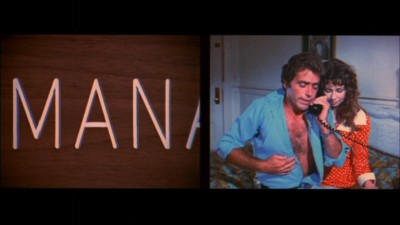
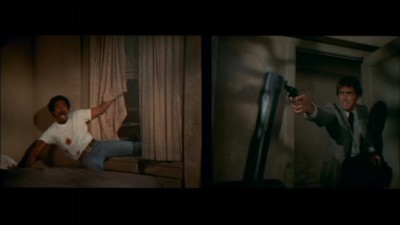
Setting aside a more detailed discussion of Duo-Vision's use here for a moment, let's just look at Wicked, Wicked itself. Written, directed, and produced by Richard L. Bare, who made a name for himself writing and directing George O'Hanlon's funny Joe McDoakes short subject series, as well as directing almost every episode of the brilliantly surreal Green Acres, Wicked, Wicked, in the hands of a better scripter, could have been a pervert's delight with the Duo-Vision process, where someone is always peeking at someone else just before sex or death. Too bad, then, that Wicked, Wicked's stilted screenplay is nothing more than an hodge-podge amalgamation of Psycho and The Phantom of the Opera that, with a few trims, would have about passed muster for the emerging made-for-TV movie market then gaining steam on the broadcast networks (I love Bare's charmingly naive assumption that we'll see Diane McBain's opening kill in the same shocking way we experienced lead performer Janet Leigh's in Psycho. I love McBain...but big star she never was...). Being blown up to huge widescreen proportions, though, only shows how paltry the script's structure, set-ups, and dialogue really are. Bare's attempts at thematic linkage are cliched (for instance, the opening scene with Jason finding the doll impaled on the fence spike, to be mirrored by Jason's own demise at the finale), while his efforts at creating suspense are inadequate, at best. Many reviewers incorrectly blame Duo-Vision for somehow ruining the suspense by showing the killer early on, as well as showing him at the same time he's stalking a victim (as if seeing this eliminates the resulting suspense of what, when, and how). However, there have been many successful suspensers that showed the killer right off the bat--the problem here isn't Duo-Vision, but that Bare doesn't know how to create suspense for one movie, let alone two. Why, for instance, does Bare continue to try and convince us that "Kookie" is a possible suspect, when he's already revealed the real killer's identity? It's just wasted padding in a movie too filled with such superfluous window dressing ("Kookie's" death is a classic low-budget demise: he just disappears, with Scott Brady telling us he died...while Bare cuts to that car accident stock footage from BUtterfield 8 we've seen a hundred times, its anamorphic image incorrectly "squeezed" on the fullscreen left panel). Bare can't even stage the tacky murders with any juice or visual flair (the PG rating really works against Wicked, Wicked; if any movie needed the R-rated cheap thrills of nudity, perverted voyeurism, and slasher bloodbaths, it's Wicked, Wicked).
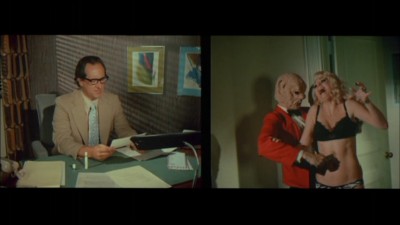
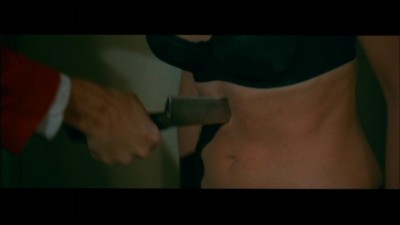
As for watching Wicked, Wicked for "camp" value, certainly there are a few moments here that might qualify under that overused (and frequently inexact) term...but there aren't nearly enough to make Wicked, Wicked something that could be enjoyed in inverse ratio to its poor quality. Bare, at the time of release, apparently applied the term himself to the finished product, but whether that tone was intentionally sought all along by the writer/director...or it was employed as a self-protecting readjustment once he really saw what he had made, is open to debate. Sure, some of the lines are pulpy and over-the-top, and good for a laugh. When Bailey snarls at "Kookie," "We don't need any beach freak making out with the guests," it's a highlight, as is Indira Danks' come-on, "I feel another toothache coming on," to which Bailey dismisses, "Sorry, I'm not drilling today." And frankly, anytime Bolling does her singing shtick, I hit the floor (it's not so much the aggressively awful bumps and grinds she attempts, but rather the very sound of her appalling yowling--it's very much like Mercedes McCambridge trying to approximate Rita Coolidge). However, any discernible attempt to be deliberately "campy" comes and goes here in Wicked, Wicked with distressing infrequency, so when we're confronted with the jaw-dropping inanity of Bailey's and Bolling's lovemaking montage (complete with shots of fireworks, Teddy Roosevelt and the A-bomb), we just assume it had to be deliberate...but when we see the sublimely bizarre finale, where Scott Brady, confronting a ready-to-jump Roberts, sneering, "Let me handle it. 'Reverse' usually works with these psychos," before insulting the kid to his death, we're not at all sure if Brady's hilariously sheepish "Oops" face was planned, or happenstance.
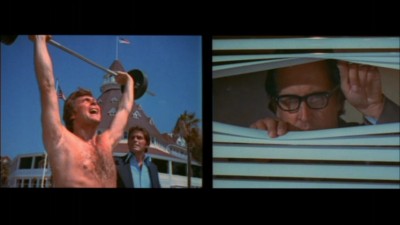
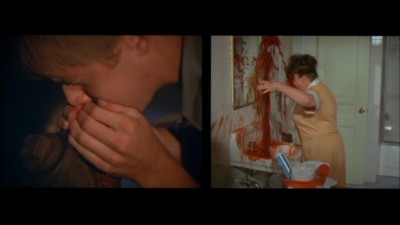
And that just leaves us with the Duo-Vision. Now, I love a good movie gimmick. When I was a kid, any William Castle movie got extra kudos just for the goofy, over-the-top tricks he pulled (at least the ones you could still decipher in their TV versions). And nothing will ever compare to sitting in a theater as a little kid and feeling dust falling on my face as the Sensurround speakers cracked the ceiling plaster during Earthquake. So it's not that I'm taking Duo-Vision too seriously--it's just that Bare didn't. Perhaps in the hands of a different director, it could be a potentially rich, rewarding technique. A couple of times, Bare seems to be on the right track in using it to amplify what we're watching, in particular the scene where Jason details his unhappy childhood to Ms. Caradyne as we see flash-forwards and flashbacks, for both her and him, giving us new information that comments on the dialogue (it's a complicated scene with some tricky dynamics that Bare gets just right). However, most of the time, Duo-Vision in Bare's hands is used for cheap laughs and attempted shocks, like a close-up of the word "Manager"--just showing "Man"--with Rick in bed with Genny on the other panel, or Seinfeld's "Mr. Pitt" asking how the murderer wants his prime rib ("Medium rare") as McBain's bloody corpse is shown in the tub. Bare said in interviews that he gave viewers a "break" by switching to full widescreen during several shock scenes, but all that does is prove the Duo-Vision technique is a failure in his hands. Two images of the same violent act are somehow diluted when shown side-by-side; when Bare goes to full widescreen, the violence is more cohesive, more visceral (you can see the difference in the original trailer, as well, which is in full widescreen--seen this way, the shots seem more distinct). Add to Duo-Vision's inert problems not one but two frames inadequately dressed and lit (Bare is incapable of creating a menacing mise-en-scene), and certainly the movie's most disastrous mistake--ladling on that old Phantom of the Opera organ score (why in the world would you tout some supposedly new, cutting-edge visual schematic...and then make it look ridiculous by saddling it with something so determinedly jokey and old-fashion sounding?)--and what results is a suspenser that's twice as bad as it needed to be.
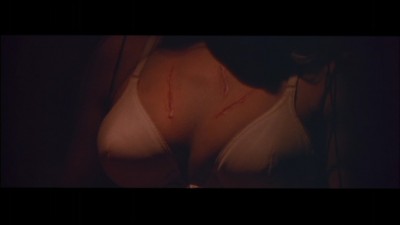
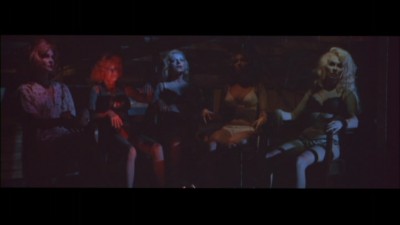
The Video:
From a couple of sources I read, there was apparently a two year restoration process for Wicked, Wicked? Is that right? Because I can't see it here in this only-okay 2.40:1 (supposedly it was projected at 2.65:1 in theaters) anamorphically-enhanced widescreen transfer: the original materials have faded in spots to greens and reds; the image is sometimes grainy and noisy (certainly some of that is the original cheap, on-the-fly cinematography); and pixilation compression issues cropped up a few times during some dark sequences.
The Audio:
What is nice is the Dolby Digital English 2.0 stereo mix, that correctly puts back the directional sound of the original theatrical presentation. Re-recording levels are strong, with low hiss. No subtitles or closed-captions.
The Extras:
An original trailer for Wicked, Wicked is included.
Final Thoughts:
Missed It, Missed It. When you wind up only being able to enjoy a movie for all the things it gets wrong...then those "wrongs" had better be off the charts, because otherwise, the fun dissipates rapidly. Wicked, Wicked's gimmick, Duo-Vision, is potentially quite strong...but frustratingly only effective once or twice here in Robert L. Bare's goofball production. Whether he meant this all as a gag, or said he did when he saw how awful it turned out, is up to you. I'm going to suggest a rental for Wicked, Wicked, just for those curious about the Duo-Vision "process," and for those looking for real laughs...and those would be from Ms. Bolling's singing.
Paul Mavis is an internationally published movie and television historian, a member of the Online Film Critics Society, and the author of The Espionage Filmography.


|
| Popular Reviews |
| Sponsored Links |
|
|
| Sponsored Links |
|
|
| Release List | Reviews | Shop | Newsletter | Forum | DVD Giveaways | Blu-Ray | Advertise |
|
Copyright 2024 DVDTalk.com All Rights Reserved. Legal Info, Privacy Policy, Terms of Use,
Manage Preferences,
Your Privacy Choices | |||||||













